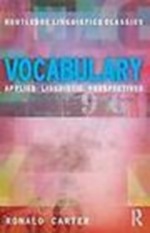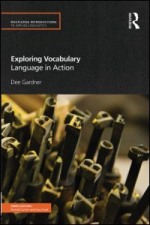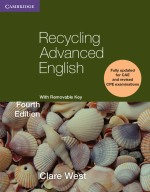Short Book Reviews
Hanna Kryszewska, Poland
Hanna Kryszewska is a teacher, teacher trainer, trainer of trainers. She is a senior lecturer at the University of Gdańsk, and EU Teacher Training College where she trains pre-service teachers. She is co-author of resource books: Learner Based Teaching, OUP, Towards Teaching, Heinemann, The Standby Book, CUP, Language Activities for Teenagers, CUP, The Company Words Keep, DELTA Publishing, and a course book series for secondary schools: ForMat, Macmillan. She is also co-author of a video based teacher training course: Observing English Lessons. Hania is a Pilgrims trainer and editor of HLT Magazine.
E-mail: hania.kryszewska@pilgrims.co.uk

Vocabulary. Applied Linguistic Perspective. R. Carter. Routledge (2012). ISBN-978-0-415-69934-1, pp 291. The book is a new edition of a1998 classic, which at the time mapped out the current knowledge about vocabulary and how to teach it. Its publication coincided with the development of the Lexical Approach, first proposed by Michael Lewis in 1993. In Vocabulary Ronald Carter looks first at what it means to analyse a word or what constitutes a word. The quote included in the first chapter from Mel'čuk sums it up perfectly: ‘Not only every language but every lexeme of a language is an entire world in itself.’ In other words, when we consider a word we need to consider its form, its lexemes, the grammatical and lexical aspects of the word, morphemes and morphology, word formation, multiple meanings of a word, relations of meanings, structural semantics, word frequencies, and many more. So many aspects come into play when we want to learn about a word or have to decide how to teach it. Nowadays corpus analysis of words provides insights into how words are used; words which may seem ‘insignificant’ like now, borrow, head, just or cheeky. Looking at how these words are presented or rendered in present-day dictionaries reflects the new approach. Like Firth said in 1957: ‘You shall know a word by the company it keeps’. In other words, you cannot teach a word in isolation; it comes with its entire world. Hence I would much more prefer we started to use the word lexis rather than vocabulary to mark the new trend or approach to researching and teaching words. In Vocabulary researching vocabulary/lexis also points towards spoken and written grammar (see: Exploring Spoken English, R. Carter and M. McCarthy, 1997. CUP). The new edition of Vocabulary comes with a new introduction which takes on board digital tools which have influenced lexicography, new developments in corpus analysis, vocabulary testing and assessment. The book is suitable for ELT professionals, MA and PhD students. Highly recommended.

Exploring Vocabulary. Language in Action. D. Gardner. Routledge. (2013). ISBN 978-0-415-58545-3, pp112. This book has been published in the Routledge Introductions to Applied Linguistics series; series editors Ronald Carter and Guy Cook. The book offers a balanced theory and practice approach to teaching vocabulary. It looks at the linguistic, psychological and pedagogical aspects of learning words. The author has adopted a back-to-front approach, which is very reader friendly, especially for readers who is academically less experienced. This approach means that first the author presents some life examples and issues, which then are related to theory. The book is very well structured; the author first sets the scene, presents his way of thinking about vocabulary and the various realities in which vocabulary exists. The latter involve: 1. psychological reality (what happens in our brains and memory when we learn vocabulary), 2. linguistic reality (how vocabulary is used in communication), and finally 3. pedagogical reality (how vocabulary is taught and learned in formal and informal situations). The next chapter is devoted to the language and terminology which is used to discuss vocabulary: word families, frequencies, form based concepts, word relationships, concordancing and many other. Now and then there is a task for the reader to do. The tasks offer some reflection or check the reader’s understanding of the language issue in question. Needless to say the answer or suggested answer is given at the end of the book. The next chapters of the book look at core vocabulary in English register specific vocabulary, tasks of vocabulary learning and building vocabulary knowledge. The book comes with a number of appendices including online resources for learning high frequency vocabulary, a list of selected compound words frequent hyphenated words, as well as a glossary and a list of books suggested for further reading.

Recycling Advanced English. C. West. Cambridge. (Fully updated for CAE and revised CPE examinations 2013). ISBN 978-1-107-65751-9, pp270. This is the fourth edition of a book first published in 1995. This edition has been fully updated and revised to suit the needs of learners preparing for the Cambridge CAE and CPE exams. The book has a strong lexical focus as three of its five sections are devoted to lexis: phrasal verbs, vocabulary and word study. (The other two are devoted to grammar and writing). Some of the lexical exercises are innovative and interesting, yet some are a bit tedious and very traditional. Since the book comes with a key it would be best used as a self-study material, which the learner can dip in as they see fit.

Please check the Methodology and Language for Secondary Teachers course at Pilgrims website.
Please check the Teaching Advanced Students course at Pilgrims website.
Please check the How to be a Teacher Trainer course at Pilgrims website.


|